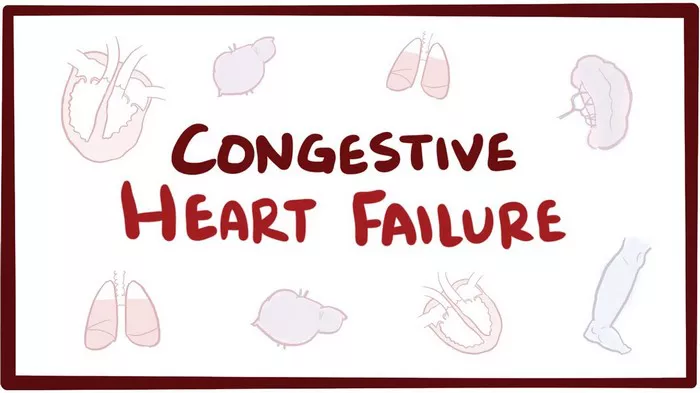Congestive heart failure (CHF) is a chronic condition that progressively worsens over time, especially if left untreated or poorly managed. End-stage CHF refers to the advanced phase of the disease where the heart’s ability to pump blood efficiently is severely compromised. This critical stage is characterized by a range of debilitating symptoms that significantly impact a person’s quality of life. Understanding these symptoms is crucial for early detection, appropriate management, and improving outcomes for individuals with end-stage CHF.
1. Persistent Fatigue and Weakness:
One of the hallmark symptoms of end-stage CHF is extreme fatigue and weakness that persists despite adequate rest. This fatigue is often debilitating, making even simple tasks exhausting for patients. It results from the heart’s inability to pump enough oxygen-rich blood to meet the body’s demands, leading to reduced energy levels and stamina.
2. Shortness of Breath (Dyspnea):
Dyspnea, or shortness of breath, is another common and distressing symptom in end-stage CHF. Patients may experience difficulty breathing even at rest or with minimal exertion. This symptom occurs due to fluid buildup in the lungs (pulmonary edema) caused by the heart’s impaired pumping function. The sensation of breathlessness can be frightening and may worsen with physical activity or when lying flat.
3. Persistent Coughing:
Chronic coughing, especially at night or when lying down, is often seen in end-stage CHF patients. This cough is typically dry and non-productive, resulting from fluid accumulation in the lungs irritating the airways. It can contribute to further discomfort and sleep disturbances, impacting overall well-being.
4. Swelling (Edema) and Fluid Retention:
Edema, or swelling, is a common symptom of CHF, particularly in the legs, ankles, and feet. In end-stage CHF, this swelling can become more pronounced and may also affect the abdomen (ascites) and other parts of the body. Fluid retention occurs due to the heart’s reduced ability to pump blood effectively, leading to fluid buildup in tissues and cavities.
5. Weight Gain and Fluid Overload:
End-stage CHF patients often experience rapid weight gain due to fluid retention and fluid overload in the body. This weight gain can be significant over a short period and is a critical indicator of worsening heart failure. Monitoring weight regularly is essential in managing CHF and preventing complications.
6. Decreased Exercise Tolerance:
As CHF progresses to end-stage, individuals may notice a significant decline in their ability to engage in physical activities. This decreased exercise tolerance is a result of the heart’s limited capacity to supply oxygenated blood to muscles during exertion. Patients may become easily fatigued, short of breath, and unable to participate in activities they once enjoyed.
7. Chest Pain or Discomfort:
While chest pain (angina) is more commonly associated with coronary artery disease, some end-stage CHF patients may experience chest discomfort or pressure. This symptom can occur due to the heart’s increased workload and inadequate oxygen supply, leading to myocardial ischemia or damage.
8. Irregular Heartbeat (Arrhythmias):
End-stage CHF can predispose individuals to develop arrhythmias, which are abnormal heart rhythms. These arrhythmias may include atrial fibrillation, ventricular tachycardia, or premature ventricular contractions (PVCs). Arrhythmias can further compromise cardiac function and increase the risk of complications such as stroke or sudden cardiac arrest.
9. Poor Appetite and Digestive Issues:
Advanced CHF can affect the digestive system, leading to symptoms such as nausea, loss of appetite, and abdominal discomfort. Patients may experience difficulty eating due to feelings of fullness or bloating, contributing to nutritional deficiencies and weight loss.
10. Mental Health Changes:
End-stage CHF can also impact mental health, leading to symptoms such as anxiety, depression, confusion, or cognitive decline. These changes may be attributed to decreased cerebral perfusion due to reduced cardiac output, medication side effects, or the emotional toll of managing a chronic and debilitating condition.
11. Increased Urination at Night (Nocturia):
Nocturia, or frequent urination at night, is a common symptom in end-stage CHF patients. It results from the body’s attempt to eliminate excess fluid accumulated during the day, leading to disrupted sleep patterns and further fatigue.
12. Worsening Renal Function:
End-stage CHF can contribute to renal dysfunction or chronic kidney disease (CKD) due to reduced blood flow to the kidneys and fluid imbalances. Declining kidney function can exacerbate fluid retention, electrolyte imbalances, and metabolic disturbances, requiring careful monitoring and management.
13. Cool and Pale Extremities:
In severe cases of end-stage CHF, peripheral vasoconstriction may occur, leading to cool, clammy, or pale skin in the extremities. This symptom is a sign of poor circulation and reduced tissue perfusion, indicating advanced disease progression.
14. Increased Heart Rate (Tachycardia):
Tachycardia, or a rapid heart rate, can be observed in end-stage CHF patients as the heart attempts to compensate for its reduced pumping ability. However, persistent tachycardia can strain the heart further and contribute to cardiac decompensation.
15. Signs of Congestion:
Physical examination may reveal signs of congestion, such as jugular venous distention (JVD), hepatomegaly (enlarged liver), and peripheral edema. These findings indicate fluid overload and the need for aggressive diuresis and fluid management strategies.
Conclusion
End-stage CHF is characterized by a constellation of symptoms that reflect the profound impact of advanced cardiac dysfunction on multiple organ systems. Early recognition of these symptoms, along with comprehensive management strategies focusing on symptom relief, fluid balance optimization, medication adjustments, and lifestyle modifications, is essential in improving outcomes and enhancing the quality of life for individuals living with end-stage CHF.


